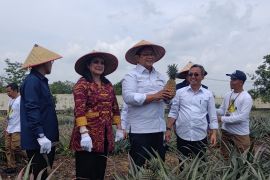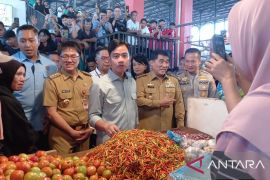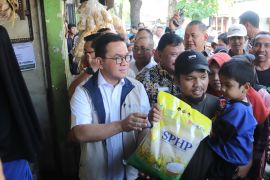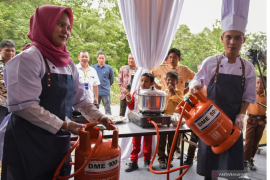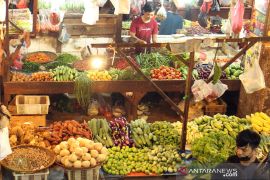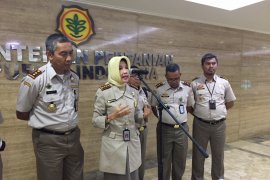Meanwhile, the availability of chicken meat as well as beef is safe in 34 provinces.Jakarta (ANTARA) - Coordinating Minister for Economic Affairs Airlangga Hartarto has asked local governments to monitor commodities that could contribute to inflation and increase the poverty rate in order to keep the national inflation rate in check.
At the 2022 Central and Regional Inflation Control Coordination Meeting on Wednesday, he said that Indonesia's inflation had reached 4.69 percent, however, it was under control since the prices of imported products were still being subsidized, thus they were not contributing much to the inflation rate.
Hence, the central government must prepare to overcome the potential of rising inflation by controlling commodities that may push up the rate, including onions, red chilies, cayenne pepper, cooking oil, and meat.
According to data from Statistics Indonesia (BPS), in August 2022, the year-on-year inflation rate in 27 provinces was above the national figure.
The province with the highest inflation rate was Jambi, followed by West Sumatra, Central Kalimantan, Maluku, Papua, Bali, Bangka Belitung, Aceh, and Central Sulawesi.
Related news: Food security creates national economic stability: Hartarto
Meanwhile, the provinces whose inflation rates were below the national level were Banten, West Kalimantan, Gorontalo, North Maluku, North Sulawesi, Jakarta, and West Papua.
The governments of the regions were invited to the Presidential Palace by President Joko Widodo, and he asked them to complete compiling data on the stocks and prices of the commodities that contributed to inflation in each region, the coordinating minister noted.
Furthermore, the government is also continuing to monitor the stocks of a number of strategic food commodities, he informed.
For instance, rice stocks are safe in 29 provinces. However, the availability of the commodity is vulnerable in five provinces, namely Riau, Bangka Belitung, Riau Islands, North Maluku, and West Papua.
Meanwhile, the supply of corn is safe in 29 provinces; vulnerable in 2 provinces, namely Central Kalimantan and East Kalimantan; and low in the remaining provinces, including Riau Islands and Bangka Belitung Islands.
Related news: Minister Hartarto, Indian industry minister discuss cooperation, IPEF
"The availability of chili is safe in 7 provinces and vulnerable in 17 provinces, including East Kalimantan, North Sumatra, South Kalimantan, and Aceh. While, the supply of the commodity is low in 10 provinces, including Riau, Riau Islands, North Kalimantan, Bangka Belitung Islands, and Central Kalimantan," Hartarto informed.
Furthermore, the stocks of cayenne pepper are available in 10 provinces; vulnerable in 14 provinces, including West Java, Banten, Jakarta, Lampung, and Southeast Sulawesi; and low in 10 provinces, including North Maluku, West Papua, North Kalimantan, Bangka Belitung Islands, and Maluku.
According to the coordinating minister, the supply of granulated sugar is safe in 27 provinces and vulnerable in the remaining provinces, including West Papua, Papua, North Sulawesi, North Kalimantan, and East Kalimantan.
Meanwhile, garlic is available in 34 provinces.
Stocks of shallots are safe in 14 provinces; vulnerable in 4 provinces; and low in 6 provinces, namely North Kalimantan, Bangka Belitung Islands, North Maluku, Papua, West Papua, and Maluku.
"In addition, the supply of eggs is available in 23 provinces; vulnerable in 8 provinces; and low in 3 provinces, namely NTT (East Nusa Tenggara), Maluku, and Papua. Meanwhile, the availability of chicken meat as well as beef is safe in 34 provinces," Hartarto added.
Related news: Minister spotlights eight regional inflation control steps
Related news: Inflation may surpass economic growth in third quarter: minister
Translator: Kuntum Riswan, Uyu Liman
Editor: Fardah Assegaf
Copyright © ANTARA 2022


